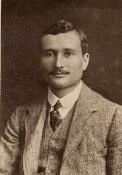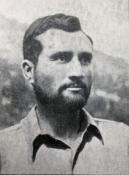
War Memorial
| Captain Everard Cecil SMITH | |
|
4th Battalion Royal Fusiliers (City of London Regiment) Date of birth: 3rd February 1885 Date of death: 23rd August 1914 Killed in action aged 29 Buried at St Symphorien Military Cemetery Plot II Row A Grave 5 |

|
| Everard Cecil Smith was born at the Rectory, Titsey in Surrey on the 3rd of February 1885 the elder son of Reverend Cecil Evan Smith, Rector of Titsey, and Rosamond Linda (nee Rushworth) Smith later of Villa Franca, Tiverton in North Devon. He was educated at Hazelwood School until July 1897 where he was a member of the Choir. When he left the school the magazine wrote the following: - "....has been snapped up by Winchester long before his proper time. He would have been conspicuous in many a sphere and his departure is very deeply regretted by everyone. " He went on to Winchester College, where he was in Fearon’s House from September 1897 to December 1903. He was appointed as a House Prefect, was a member of the Shooting VIII in 1902 and 1903 and was a member of the 1st Volunteer Battalion, Hampshire Regiment. He was a member of Limpsfield Chart Golf Club. On the 8th of August 1903 he applied to take the examination for entrance to the Royal Military College Sandhurst. He passed 5th at the entrance exam and entered the College in 1904, passing out 7th in his Division in August 1905 with honours, having represented the College in the Shooting VIII in 1904. He was commissioned as a 2nd Lieutenant in the Royal Fusiliers (City of London Regiment) on the 16th of August 1905 and was posted to the 3rd Battalion of his regiment. He was promoted to Lieutenant on the 20th of August 1908. He was employed in 1906 for fifteen months on a survey of the Cape Colony, where he passed through the School of Musketry at Bloemfontein with honours. He won the Gold Medal in June 1909 for achieving 2nd place in the Army Shooting Championship in South Africa; he was 2nd in the Open Individual Championship. He returned home to England on leave in the summer of 1910 and rejoined his Battalion in Mauritius that September. He was posted to Meerut in 1911 where he won the Subaltern’s Cup in at the Bengal Rifle Meeting that year. In July 1914, while on leave, he was attached to the 4th Battalion of his regiment and, following the outbreak of war, he embarked for France with his battalion from Southampton on board the SS "Martaban" at 5pm on the 13th of August 1914. They arrived at Le Havre at 4am the following morning and disembarked at 8.20am. On the 23rd of August 1914 the 4th Battalion Royal Fusiliers met the advancing Germans at Nimy near Mons. They had been marching north in order to make contact with the invading Germans and found themselves, that morning, protecting the bridges over the canal and were exhausted from working most of the night to prepare for the defence of the bridges. The Germans could be heard moving around the woods to the north of the canal and early in the morning a German cavalry patrol galloped towards the bridge but fierce fire from the Fusilier killed one enemy officer and drove off the rest of the patrol. The German infantry began to attack, but moving as they were, in full view of the British troops they were cut down in great numbers. The Fusiliers were given orders to prepare to retire at 10 minutes notice as the German artillery had crept round the side of their positions and were now taking them in enfilade. Captain Ashburner’s company was under particular pressure and called for reinforcements from Nimy, all the time pouring heavy fire against the advancing German troops. A platoon under Everard Smith arrived to assist and it was reported by men captured in the action who were interviewed later in Switzerland that Lieutenant Smith showed great courage and shot eight Germans before himself being hit in the head, saying only, "Carry on Goss" to his bugler, before falling back dead. Only six men of his platoon were unwounded when the trench was surrounded. During this action Lieutenant Maurice James Dease and Private Sidney Frank Godley won the first two Victoria Crosses of the Great War. He was posted as missing and enquiries were made as to his fate. Interview with Private 7680 H. Turner, B Company, 4th Battalion Royal Fusiliers taken at Merseburg prisoner of war camp on the 26th of May 1916: - "On the morning of the 23rd of August 1914 I saw Captain Smith hit by a bursting shell, when I passed him he appeared to be dead. He was one of my Company officers" Private L/11614 Edward Goss, 4th Battalion Royal Fusiliers wrote from prisoner of war camp in Germany: - "Dear Madam, To explain what I know will take few words, but many could I use, to express my high regards of his actions. I was with your son, as his bugler, the whole of the time. He was too brave, and exposed himself perhaps too much with the result that he received a rifle shot in the head, which injured his brain, he lived but a few moments in which he said "Carry on Goss", then dropped his head and died. I buried his sword, revolver, maps etc. after ascertaining that life was extinct, and in my opinion I am confident that there is no possibility of his having been merely unconscious as his wound was too severe. This occurred at about 2 – 2.30 p.m. 23rd Aug 1914. I was captured with 22 others at about 6.30 p.m. His body still lay where he received his wound, when we were marched away. There was no other person present at the time your son met his death, his servant however, Private White came up 10 or 15 minutes later. Lieut. Smith was a good officer and a gentleman who always had the goodwill of the men under his command…" His mother received a letter from Corporal McLelland, written shortly after his release from prisoner of war camp in Germany in August 1916: -"Lieut. Smith deliberately picked off eight Germans in succession. Just as he was about to fire his ninth round he fell back, himself wounded." She relayed this to the War Office in a letter dated the 14th of August 1916: - ".......have heard - that Capt. E.C. Smith was alive when the Germans took the trench and was left lying on the ground with all the other men who were very badly wounded - the man who states this says he saw that Capt. (or Lieut. as he was then) Smith was conscious and went to him and was lifting him when he himself was shot in the leg. He says the officer had a very bad wound in the back of the head but was certainly alive when he left him." He was promoted to Captain on the 14th of September 1914, before his death had been confirmed. He was officially declared as dead in September 1916. He is commemorated on the war memorial at Winchester College and on the memorial at the Royal Military College Sandhurst. He is also commemorated on the memorial at Limpsfield Chart Golf Club. |
|
 | |
| Went on to Winchester College |
Back